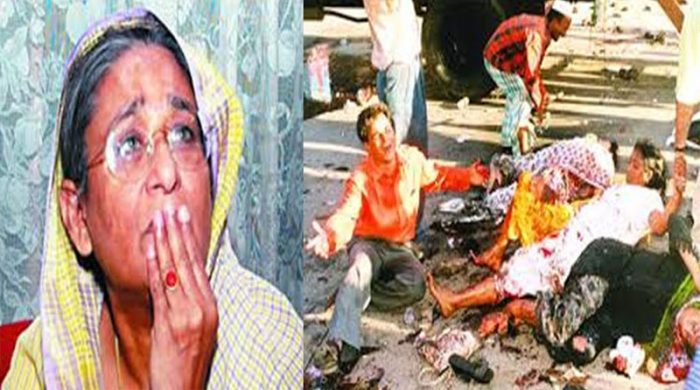
Today is the bloody horrible August 21, another horrific day after the 75th massacre in the history of Bangladesh.
Exactly 16 years ago, during the BNP-Jamaat coalition government, on this day in 2004, an unprecedented massacre was carried out in a peaceful political rally in the capital city.
The purpose of the grenade attack was to kill Sheikh Hasina. The Awami League President, the then leader of the opposition in parliament was the victim of terror when she came to protest against terrorism at a rally on the street in front of the central office on Bangabandhu Avenue. In that incident, the party leaders and activists made human armor and saved President Sheikh Hasina, but a total of 24 leaders and activists, including Ivy Rahman, the Awami League’s women’s affairs secretary and wife of the late President Zillur Rahman, were killed by a grenade.
The verdict in the grenade attack trial proved the involvement of ministers and officials of the then ruling BNP coalition government—the attack was carried out with the direct help of that government. The attack was carried out with the direct help of that government. The attack was carried out with the direct help of that government.
Today, the Bengali nation will reverently observe the 16th anniversary of the worst grenade attack in history.
President Abdul Hamid and Prime Minister Sheikh Hasina gave the message on the day. Various political, social and cultural organizations including the ruling Awami League have taken up the programme to observe the day. However, due to the corona infection, the programme has been cut slightly compared to other years.
A press release issued by the Awami League on Thursday (August 20th) referred to the August 21 grenade attack as a continuation of the barbaric killings of the night of August 15, 1975, and said it was a heinous conspiracy of the bloodthirsty BNP-Jamaat evil alliance to assassinate Bangabandhu’s successor Sheikh Hasina. The then Prime Minister and BNP Chairperson Khaleda Zia, her son Tariqu Rahman, close associate of international mafia don Dawood Ibrahim, war criminal Matiur Rahman Nizami, Ali Ahsan Mohammad Mujahid, State Minister for Home Affairs Mufti Hannan and other anti-liberation activists were involved in the attack.
It further said that the government is continuing its efforts to bring back the fugitive accused including BNP vice chairman Tarique Rahman, the mastermind of the August 21 grenade attack, to the country.
Judicial Process // The trial of the case started in 2008 after the caretaker government backed by the army took over. Later in 2009 the Awami League-led grand alliance government came to investigate further.
On July 3, 2011, the CID filed a supplementary charge sheet against BNP leader Tarique Rahman, former state minister for home affairs Lutfuzzaman Babar, Harish Chowdhury, Jamaat leader Ali Ahsan Mohammad Mujahid and 30 others. After that, out of the total 52 accused in the two charge sheets, 16 people including Tarique Rahman were shown as fugitives and the trial started. After 14 long years, the verdict was announced in the case of the grenade attack on October 10, 2017. Among the 49 surviving accused in the two cases, BNP acting chairman Tarique Rahman, Harish Chowdhury, former MP Kaikobad and 19 others were sentenced to life imprisonment and former state minister for home affairs Lutfuzzaman Babar.Deputy Minister Abdus Salam Pintu executed 19 people. The remaining 11 have been sentenced to different terms. Of the 19 convicts sentenced to life imprisonment, 13 are fugitives. The case is now pending in the high court.